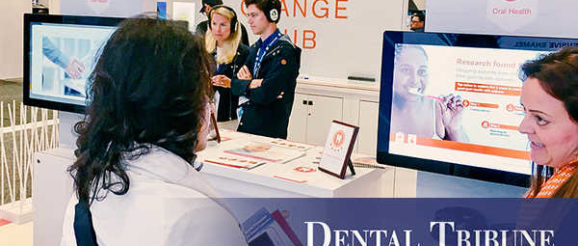GSK Behavioral Change Innovation Hub showcases at ADA FDI World Dental Congress

GSK Behavioral Change Innovation Hub showcases at ADA FDI World Dental Congress
September 06, 2019
SAN FRANCISCO, U.S.: Dentists often refer to encouraging positive behavioral change in their patients as one of the greatest challenges they face, and GSK is embarking upon a new journey in behavioral science to support them in overcoming that challenge. Despite our best efforts, oral health is not improving. Caries is the most prevalent condition and severe periodontitis is the 6th most common disease globally. GSK is addressing this by working alongside dental health professional’s onsite to co-create interventions that help to overcome the challenges posed.
Joining forces with behavioral economists and psychologists—The Behavioral Architects—GSK is currently working to uncover new behavioral insights to create interventions that support dental health professionals in their communication with patients. Following a first round of qualitative research with dental health professionals and patients about gum health in both the U.S. and UK, GSK have uncovered five key challenges which are addressed at the GSK booth (#1327).
DTI took a tour of the hub to learn more about how behavioral science can influence dental professionals in thinking differently about the inertia around oral health, especially in gum disease, with an overall goal to inspire change through different mindsets and approaches. The five challenges are addressed in mini videos presented by Crawford Hollingsworth, Social Psychologist and Behaviorial Scientst.
Challenge 1: A lack of salience of gum health
There is a lack of discourse surrounding gum health and gum disease in society at large. That lack of discourse leads to limited motivation or ‘behavioral change energy’ in patients.
Challenge 2: A lack of “rules of thumb” for gum health
Patients have very few feelings of personal connection with gum disease and new reference points or “rules of thumb” are required to make gum disease more meaningful to them.
Challenge 3: Reframing gum disease
Human beings have a lack of empathy for their future selves and so have little motivation to act on an intangible future state. Reframing gum disease can help patients to think and act in a present state.
Challenge 4: Maximizing the dental appointment time
There is a lack of time and space in and around dental appointments for conversations regarding gum health. That time and space needs to be created without lengthening appointment times.
Challenge 5: Providing behavioral feedback
It is imperative to turn one-off patient behaviors into good long-term oral health habits.
In addition, a series of supporting leaflets to help overcome these challenges are currently being created for practices. DTI also spoke with Kelly Teasdale, GSK Global Communications Lead. Teasdale explained the two facets of the initiative. GSK thrives on driving trust with dental health professionals, which in turn brings recommendations, but GSK wanted to contribute more value, in turn dentists were asked what they wanted and needed. A common area was how patient behaviors could be influenced after a patient had left the practice. This was a catalyst GSK to find a way to support dental professionals further.
Leave a Reply
Your email address will not be published. Required fields are marked *
